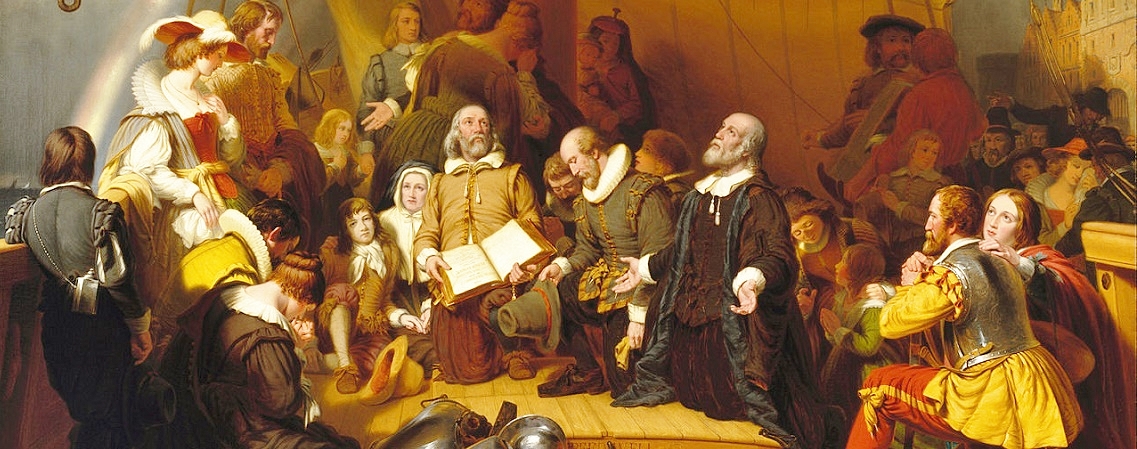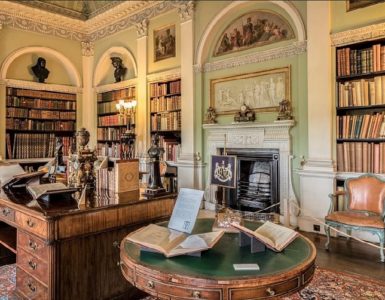The church at Leyden was the mother church of the Pilgrims in Plymouth, New England. John Robinson was pastor of the Leyden congregation in the Netherlands and continued there until his death in 1625. During his life the Plymouth Pilgrims and the Leyden Church were essentially one. As the editor of Robinson’s works, Robert Ashton, expressed it the churches were identical and it was agreed that returning members should be “reputed as members, without further dismissal or testimonial, and therefore entitled at once to take their places at the sacramental board, and to exercise their rights in the meetings of the church.” These dissenting, separatist churches in the Netherlands and Plymouth were covenanting congregational churches with each church bound by its own covenant in unity. Thus, what seems like to Presbyterians much ado about congregational polity concerning the relationship of Plymouth and Leyden was an essential point to them because of the individuality of each church.
The following text is transcribed from volume 3 of The Works of John Robinson, London, 1851, pages 490-91. Ashton notes that the list of ten characteristics he transcribed are from George B. Cheever, The Pilgrim Fathers: or, The Journal of the Pilgrims at Plymouth, New England, in 1620, 1862, which he found to agree with the earlier works by Thomas Prince, A Chronological History of New-England: in the Form of Annals…to the Arrival of Gov. Belcher, 1730, 1736, and George Punchard’s History of Congregationalism From About A.D. 250 to 1616, 1841.
I think that the characteristics or attributes of the Plymouth Church were essentially presbyterian without the connectionalism of a Presbyterian Church. The non-conformists we call Pilgrims had responded to episcopacy, whether as manifest by the papacy or the Church of England, by following the most autonomous polity they could with each church having its own covenant of unity. Even the local church body of elders is called a presbytery. According to the 10 points that follow, the Pilgrims were presbyterian in polity without connectionalism and the yet to come Westminster Standards which would become common to both Presbyterians and Congregationalists.
Barry Waugh
The following is Dr. Cheever’s enumeration of the church principles and regulations of the Plymouth Church, which are substantially those of the churches at Leyden and Amsterdam [which are also described by Ashton in Robinson]:
- That no particular church ought to consist of more members than can conveniently watch over one another, and usually meet and worship in one congregation.
- That every particular church of Christ is only to consist of such as appear to believe in and obey him.
- That any competent number of such, when their consciences oblige them, have a right to embody into a church for their mutual edification.
- That this embodying is by some certain contract or covenant, either expressed or implied, though it ought to be by the former.
- That being embodied, they have a right of choosing all their officers.
- That the officers appointed by Christ for this embodied church, are, in some respects, of three sorts, but in others, two:
(A.) Pastors, or teaching elders, who have the power both of overseeing, teaching, administering the sacraments, and ruling too, and being chiefly to give themselves to studying, teaching, and the spiritual care of the flock, are therefore to be maintained.
Mere ruling elders, who are to help the pastors in overseeing and ruling, that their offices be not temporary, as among the Dutch and French Churches, but continual; and being also qualified in some degree to teach, they are to teach only occasionally, through necessity, or in their pastor’s absence, or illness; but being not to give themselves to study or teaching, they have no need of maintenance [salary].
That the elders of both sorts form the presbytery of overseers and rulers, which should be in every particular church; and are in Scripture called, sometimes presbyters, or elders; sometimes bishops, or overseers; and sometimes rulers.
(B.) Deacons, who are to take care of the poor, and of the church’s treasure; to distribute for the support of the pastor, the supply of the needy, the propagation of religion, and to minister at the Lord’s table, &c.
- That these officers, being chosen and ordained, have no lordly, arbitrary, or imposing power, but can only rule and minister with the consent of the brethren.
- That no churches, or church officers whatever, have any power over any church or officers, to control or impose upon them; but are equal in their rights and privileges, and ought to be independent in the exercise and enjoyment of them.
- As to church administrations, they held that baptism is a seal of the covenant of grace, and should be dispensed only to visible believers, with their non-adult children; and this in primitive purity, as in the times of Christ and his apostles, without the sign of the cross, or any other invented ceremony. And that the church or its officers have no authority to inflict any penalties of a temporal nature; excommunication being wholly spiritual, in a rejection of the scandalous from the communion of the church.
- And lastly, as for holy days. They were very strict for the observation of the Lord’s Day; in a pious memory of the incarnation, birth, death, resurrection, ascension, and benefits of Christ; as also solemn fastings and thanksgiving, as the state of providence requires. But all other times not prescribed in Scripture, they utterly relinquished. And, as in general, they could not conceive anything a part of Christ’s religion, which he has not required, they therefore renounced all human right of inventing, and much less of imposing it on others.
“These,” says Thomas Prince, “were the main principles of that scriptural and religious liberty, for which this people suffered in England, fled to Holland, traversed the ocean, and sought a dangerous retreat in these remote and savage deserts of North America; that here they might fully enjoy them, and leave them to their last posterity





